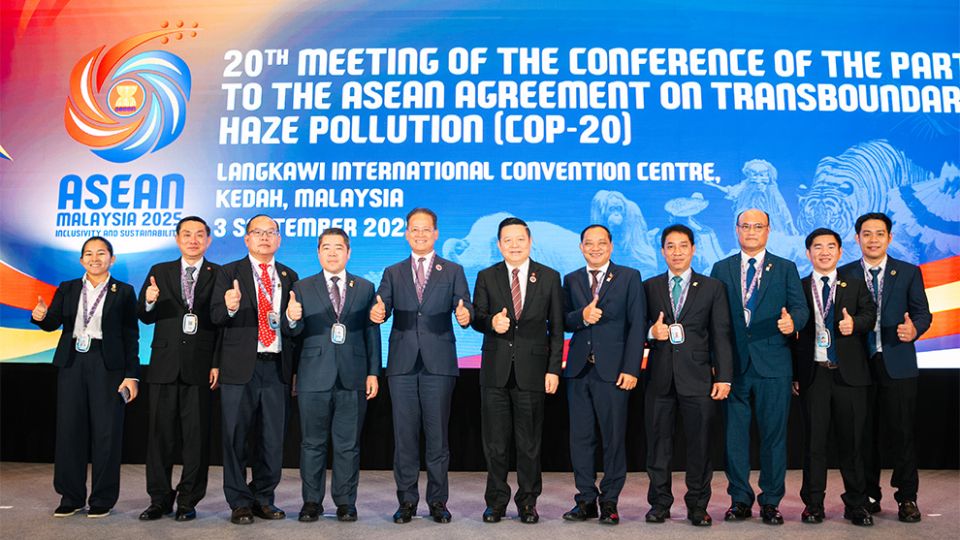September 8, 2025
PHNOM PENH – Cambodia has reaffirmed its commitment to working with ASEAN members, ASEAN+3 and the EU to address environmental challenges at both the regional and global levels.
This commitment was highlighted by Minister of Environment Eang Sophalleth during a keynote address at the 18th ASEAN Ministerial Meeting on the Environment (AMME-18), held from September 3–4 in Langkawi, Malaysia.
The minister presented Cambodia’s relevant national policies and strategies, including the implementation of the National Environmental Strategy, promotion of cleanliness and the 4R principle, tree-planting campaigns to expand green coverage and stronger enforcement of environmental laws, according to a September 6 statement from the environment ministry.
He also emphasised the Kingdom’s efforts against climate change, biodiversity conservation and tackling plastic pollution.
During the meeting, the minister, along with other ASEAN environment ministers, endorsed a Joint ASEAN Statement on Climate Change for the upcoming 30th Conference of the Parties (COP-30) to the UN Framework Convention on Climate Change (UNFCCC), scheduled for November 2025 in Brazil. The statement will also be submitted to the 47th ASEAN Summit for adoption.
All 10 ASEAN members signed an agreement to establish the ASEAN Centre for Climate Change, to be headquartered in Brunei.
On September 3, Sophalleth led a Cambodian delegation to the 20th Conference of the Parties (COP-20) to the ASEAN Agreement on Transboundary Haze Pollution, which reviewed national and regional actions to curb haze, monitor fire hotspots and address air pollution.
ASEAN countries also signed an agreement to establish the ASEAN Coordinating Centre for Transboundary Haze Pollution Control, based in Indonesia. Additionally, the meeting approved the SEACAI project on air quality and emission inventories, as well as a scholarship programme on forest fire and peatland management.
On September 4, the minister joined the 1st ASEAN–EU Ministerial Dialogue on Environment and Climate Change, which adopted a joint communiqué and endorsed the ASEAN–EU Work Programme 2025–2026.
In this forum, ASEAN and the EU reaffirmed their shared commitment to tackle three major global environmental crises: climate change, biodiversity loss and pollution. They emphasised alignment in implementing the Paris Agreement on Climate Change, accelerating national contributions under the UNFCCC before COP-30 in Brazil, and the urgency of reducing greenhouse gas emissions by 2035 to achieve carbon neutrality by 2050.
Acknowledging socio-economic opportunities, ASEAN and the EU pledged deeper cooperation on renewable energy, low-carbon technologies, diversified energy systems and carbon markets. They also highlighted the importance of sustainable forestry, water resource management, environmentally sustainable development and collaboration under the UN Environment Assembly.
That same day, He attended the 3rd ASEAN–Japan Ministerial Meeting on Environment and Climate Change. The meeting adopted a joint statement on a mutually beneficial ASEAN–Japan partnership for environmental and climate cooperation to achieve new progress.
The joint statement emphasised advancing public production and global sustainability through international cooperation on greenhouse gas reductions (in line with the Paris Agreement) and biodiversity conservation (under the UN Convention on Biological Diversity), while addressing local and regional environmental challenges such as waste, air and water pollution.
It also supported a stronger ASEAN–Japan partnership in circular economy development, highlighting its importance in today’s global context. ASEAN and Japan agreed to strengthen collaboration on reducing plastic pollution in the region and expand cooperation under the ASEAN Strategic Programme on Climate and Environment (SPACE).
On September 4, the 19th ASEAN+3 Environment Ministers’ Meeting (with China, Japan, and South Korea) also convened.
The attendees reviewed current cooperation progress and future plans, with a focus on biodiversity conservation, climate change, environmental education, science and technology, sustainable ASEAN cities, water resource management and marine plastic waste. They also welcomed progress in drafting the ASEAN–China Environmental Cooperation Strategic Framework and Action Plan 2026–2030.
Sophalleth also held bilateral discussions with ASEAN environment ministers and partner countries to strengthen and expand cooperation in natural resource and environmental management.
He met with his Japanese counterpart Asao Keiichiro, with Japan agreeing to sign a memorandum of understanding (MoU) to enhance cooperation on natural resource and environmental management. Japan also expressed interest in investing in cassava-based bioplastic production in Cambodia.
Myanmar will host the 19th AMME and the 22nd COP to the ASEAN Haze Agreement in 2027, while Vietnam will host COP-21 in 2026.


